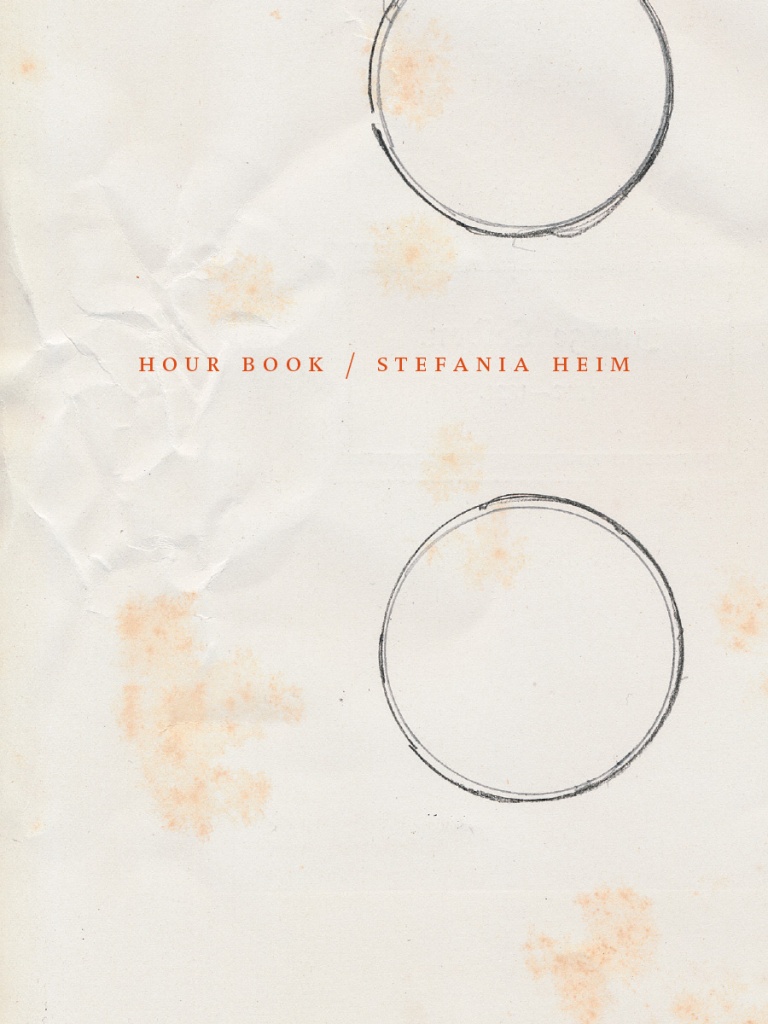
Winner of the 2018 Sawtooth Prize from Ahsahta Press.
Order at Small Press Distribution
HOUR BOOK featured on NPR’s All Things Considered. Click HERE to listen!
Praise for HOUR BOOK:
Thus, while it’s generally unadvisable to characterize poetry written by a university professor as anti-establishment, I suggest in conclusion that it’s both more challenging and more pleasurable to read these poems than many others written by researchers and teachers. Coming from someone whose profession involves her in expertise, concepts, and polemics, the lines become stranger and more mysterious than they would be otherwise, with their prayer-like anxiety and creaturely concreteness. There are only a few poets in the United States today of whom this can be said; Stefania Heim is of that company.
— Erik Noonan, “Whose Words Are Ours: Stefania Heim’s Theoretical Feminine Poetics of Terror” at Full Stop
Heim’s roving forms in Hour Book reflect this resistance as well … In these wild intonations lies Heim’s attention to what lies beyond time as a reasoning device and its naïve calculations. Again, Heim carefully thumbs an intimate slippage of logic, a ‘[p]olitics of perpetual off-ness.’
–– Jessica Q. Stark, “The Errancy of Keeping Time” at Carolina Quarterly
Structurally, [Heim’s] poems point and counterpoint in interesting ways, with the sequence of poems titled with specific times broken occasionally by a kind of “Greek chorus” of prose pieces, threading their way through the manuscript to discuss the implications of time, and these moments, holding the manuscript together quite magnificently.
— rob mcclennan
Hour Book asks ‘[d]ire questions in the most beautiful words.’ It is a document and a devotional, a recording and marveling at how female bodies—writing, gestating, caretaking, dying—reshape and prick against the ‘organizing fiction’ of standardized time.
Such bodies are imperfect, in the grammatical sense, never completed, always evolving. The ‘our’ of these hours is intergenerational, intimate, and domestic, the ‘hour’ ritualistic, theological, and literary: that is to say, ‘lyrical.’
— Jennifer Moxley, judge’s citation
When women write, it costs. We get dizzy seeing ourselves steal (beg) our lives from others with claims upon us. There is fear of falling or being pushed over. Stefania Heim’s Hour Book spins and spins in this tradition. These poems occur in the smallest of spaces, where articulation coincides with noticing or the potential to say is noticed — and to get into that “posture of attention” is a wonder to behold, both exhilarating and exhausting (like mothering/being alive). “For maximum impact // She was possessed,” she writes, and I, too, am borne into the obsessional seeing that Stefania names as devotion — devotion to having ground and sharing it in profound and careful relation with what and whom she encounters. I love Stefania’s fierceness in the struggle to see and savor experience at the granular level.
— Simone White
A poem in Hour Book asks, ‘Is every midnight the solid bottom?’ It’s in these questions and in Heim’s observational line that we see how brilliant she is in carousing a reader to think deeply and sensorially about time, pleasure, and constraint, all in a temporal gesture, all in order to contemplate what words can and cannot do: ‘Music fills the space / of distraction and I like it / when I know the words.’ Heim writes, ‘Wrote / a letter to myself from what I hoped / was safe distance.’ There are both safe distances in this book and loose ones, all that Heim measures through careful description: ‘a sleepless gloss,’ ‘a grammar that interrogates and impels.’ And all possibly punctuated by a sort of ‘time stamp’ of her particular lyric certainty. This is an exuberant collection following a vibrant world which connects mothering, childrearing, literature, language acquisition, and perceptual thinking to our sense of time, habit, and intimacy.
— Prageeta Sharma